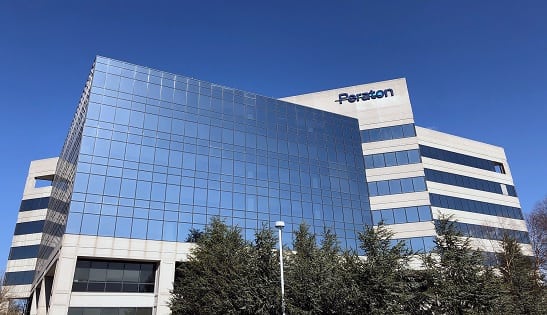
Growth is central to Mike King’s role at Peraton.
As chief growth officer for the national security-technology company, the longtime industry veteran, who most recently wrapped up a 16-year career at Northrop Grumman, leads organic and acquisitive growth objectives for a company whose customer base includes the intelligence community, Department of Homeland Security and the U.S. Air Force.
Since taking his role in March 2018, King’s daily schedule has been anything but typical. The one constant, King says, is maintaining the foundational efforts cemented by Peraton CEO Stu Shea and the company’s senior leadership team.
“My core priorities are to ensure our customers comprehend the full spectrum of Peraton’s expertise and capabilities,” King says. “We want them to know we are ready to take on their most difficult and daunting challenges.”
Complex Environments
Those challenges are occurring in ever-increasing and complex environments, fueled by advanced technologies such as cyber, machine learning and artificial intelligence, hypersonics, and space resiliency.
“Our adversaries are catching up, and they are testing our intelligence, military, and security supremacy — in many ways, the relative cost of doing this has decreased,” King says.
Meanwhile, accompanying threats have only risen.
“Whether it is fighting future wars, in all domains, or it is the increased threat from cyber — and needing strong cyber operations, because of the Internet of Things — everything becomes a sensor or an input as we move forward,” King says.
Differentiated Value
In the midst of those challenges, Peraton maintains a focus on differentiated value.
“We are not a technical services company doing business in an LPTA environment,” King says. “We support missions in all operational domains via air, land, sea, space, and cyberspace.”
That wide-ranging ability builds on the company’s legacy, in part as a government IT services division that spun-off from Harris Corporation in April 2017. Peraton has since boosted its capabilities through its first acquisition, of Strategic Resources International, a communications infrastructure developer, in April. The move affords Peraton, which now stands at 3,500 employees, greater access and technical capabilities to meet customer mission needs, in critical focus areas.
“We have robust and deep technical capabilities in things that allow us to focus on our customers’ hardest problems. We have significant experience providing highly differentiated secure communications to the government,” King says. “We have become a trusted partner; we’ve had some some of these contracts and relationships for more than 50 years—that speaks to our differentiating value.”
Broad Customer Understanding
While Peraton has the capabilities to operate, sustain and modernize legacy platforms, it is not exclusively tied to any particular software. Instead Peraton focuses on designing agile environments and frameworks, and the full spectrum of technologies that fuel fast response to changing mission and customer needs.

King helps foster this agile approach, and deepens technology understanding, through his ongoing partnership with Peraton’s executive leadership team and the company’s chief technology officer. That ongoing collaboration fosters a 360-degree view of customer needs and how to deliver full value to them.
“We want to make sure that our technical investments match our business opportunities in meeting customer needs,” says King, whose previous role as vice president of business development for Northrop’s cyber and intelligence mission solutions division deepened his understanding of customer challenges across the intelligence community, the Defense Department and many other federal agencies. Focusing on the dynamics of the customers’ mission continues at Peraton.
“In creating advanced capabilities that meet multiple mission requirements, across multiple domains, it is important to work across the full spectrum of technology creation, from basic research — low- and mid-TRL [technology readiness level]abilities — all the way to advancing technology into production,” King says. That’s where internal partnerships prove so crucial.
“We can best mature solutions, as a company, through a strong connection among the growth organization of business and the CTO and technology organizations,” King says.
INSA Participation
This year King was appointed to the Intelligence and National Security Alliance’s advisory board — this work rounds out King’s broad understanding of current customer needs, particularly across the intelligence community.
As a member of the advisory committee, King offers guidance and recommendations to the nonprofit’s leadership and senior management team on INSA’s policy initiatives.
“All who participate in INSA have a common goal, which is to ensure the security and safety of our nation are maintained,” King says. “Being able to be a part of that dialogue—and exchange ideas and information—is where the sharing comes together, and ultimately helps our government customers.”
Priorities Ahead
Reinvesting and modernizing intelligence capabilities, conventional force structures, and the nuclear triad are all top government concerns. On the industry side, King is committed to helping ensure government realizes these goals.
“We want to make sure that Peraton is best-positioned to offer our customers technical capabilities that are at the core of those investment budgets,” King says. Internally, King is equally focused on critical focus areas.
“We want to make sure we expand our team with the best talent available; communicate our capabilities and differentiated value to customers; and strive for execution excellence in all aspects of the company’s growth, so we can deliver maximum value,” King says.
While King concentrates on growth, he remains focused on the ultimate mission.
“It is vitally important to remember why we are in this business and why we do this,” King says. “The success of Peraton is going to be measured by the results achieved on behalf of the customers that we support.” Those results, he adds, are fundamental to the fabric of society.
“Our success is measured in the lives that are saved, the knowledge that is acquired, the battles that are won, the information that is secured, and the general well-being of the citizens of the United States and our allies,” King says. “That is critical to remember as we move forward.”

